英语副词归纳
副词英语词汇大全
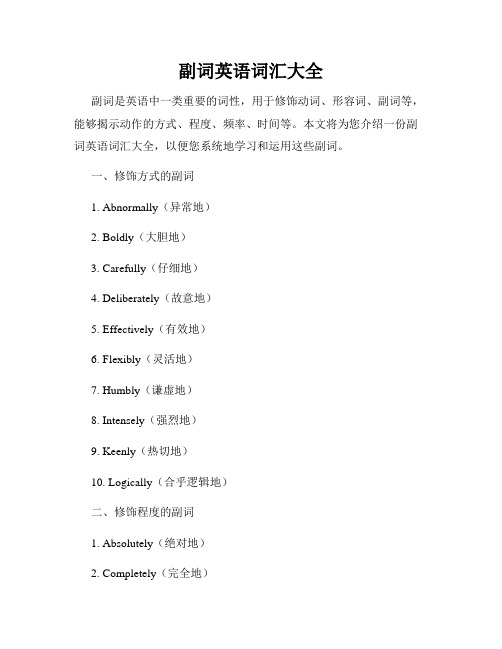
副词英语词汇大全副词是英语中一类重要的词性,用于修饰动词、形容词、副词等,能够揭示动作的方式、程度、频率、时间等。
本文将为您介绍一份副词英语词汇大全,以便您系统地学习和运用这些副词。
一、修饰方式的副词1. Abnormally(异常地)2. Boldly(大胆地)3. Carefully(仔细地)4. Deliberately(故意地)5. Effectively(有效地)6. Flexibly(灵活地)7. Humbly(谦虚地)8. Intensely(强烈地)9. Keenly(热切地)10. Logically(合乎逻辑地)二、修饰程度的副词1. Absolutely(绝对地)2. Completely(完全地)3. Extensively(广泛地)4. Incredibly(难以置信地)5. Only(仅仅)6. Quite(相当)7. Remarkably(非常)8. Slightly(稍微)9. Utterly(彻底地)10. Very(非常)三、修饰频率的副词1. Annually(每年)2. Daily(每天)3. Frequently(频繁地)4. Hourly(每小时)5. Monthly(每月)6. Occasionally(偶尔)7. Regularly(定期地)8. Seldom(很少)9. Weekly(每周)10. Yearly(每年)四、修饰时间的副词1. Afterwards(之后)2. Before(之前)3. Currently(目前)4. During(期间)5. Eventually(最终)6. Formerly(从前)7. Instantly(立刻)8. Now(现在)9. Recently(最近)10. Soon(很快)五、修饰程度和方式的副词1. Carelessly(粗心地)2. Completely(完全地)3. Honestly(真诚地)4. Properly(适当地)5. Quickly(快速地)6. Seriously(认真地)7. Smoothly(顺利地)8. Steadily(稳定地)9. Surely(确实地)10. Well(好)六、修饰地点的副词1. Above(在上方)2. Below(在下方)3. Here(这里)4. Locally(本地地)5. Nearby(附近)6. Overseas(在国外)7. There(那里)8. Underneath(在下面)9. Upstairs(在楼上)10. Within(在内部)七、修饰表情和说话的副词1. Angrily(生气地)2. Sadly(悲伤地)3. Happily(快乐地)4. Softly(轻声地)5. Loudly(大声地)6. Nervously(紧张地)7. Quietly(安静地)8. Proudly(自豪地)9. Surprisingly(令人惊讶地)10. Happily(愉快地)八、修饰数量的副词1. Almost(几乎)2. Barely(勉强)3. Entirely(完全)4. Fully(完全)5. Hardly(几乎不)6. Mostly(大多数情况下)7. Nearly(几乎)8. Partly(部分地)9. Scarcely(几乎不)10. Wholly(完全)九、修饰推测的副词1. Apparently(显然)2. Certainly(肯定)3. Possibly(可能)4. Likely(可能)5. Maybe(或许)6. Presumably(大概)7. Surely(肯定)8. Perhaps(或许)9. Probably(可能)10. Undoubtedly(无疑地)以上是一份副词英语词汇大全,其中包含了各类副词及其常见用法。
英语中副词及用法
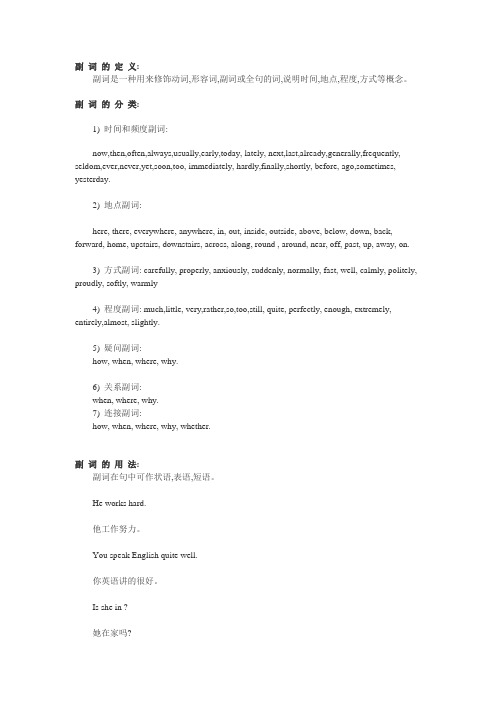
副词的定义:副词是一种用来修饰动词,形容词,副词或全句的词,说明时间,地点,程度,方式等概念。
副词的分类:1) 时间和频度副词:now,then,often,always,usually,early,today, lately, next,last,already,generally,frequently, seldom,ever,never,yet,soon,too, immediately, hardly,finally,shortly, before, ago,sometimes, yesterday.2) 地点副词:here, there, everywhere, anywhere, in, out, inside, outside, above, below, down, back, forward, home, upstairs, downstairs, across, along, round , around, near, off, past, up, away, on.3) 方式副词: carefully, properly, anxiously, suddenly, normally, fast, well, calmly, politely, proudly, softly, warmly4) 程度副词: much,little, very,rather,so,too,still, quite, perfectly, enough, extremely, entirely,almost, slightly.5) 疑问副词:how, when, where, why.6) 关系副词:when, where, why.7) 连接副词:how, when, where, why, whether.副词的用法:副词在句中可作状语,表语,短语。
He works hard.他工作努力。
英语副词的用法总结
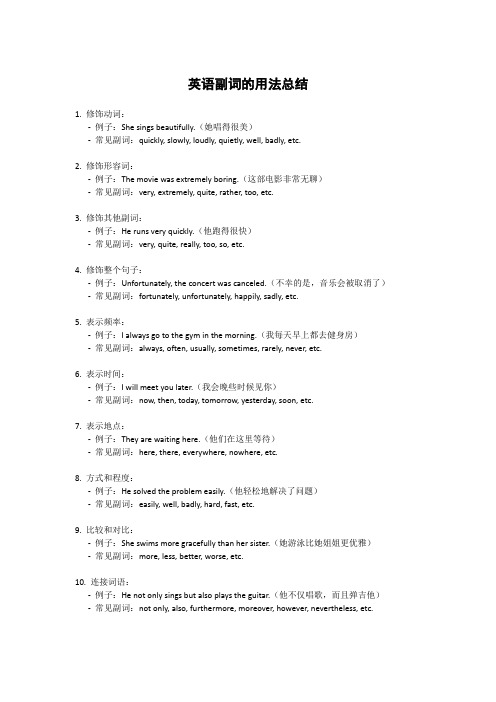
英语副词的用法总结1. 修饰动词:-例子:She sings beautifully.(她唱得很美)-常见副词:quickly, slowly, loudly, quietly, well, badly, etc.2. 修饰形容词:-例子:The movie was extremely boring.(这部电影非常无聊)-常见副词:very, extremely, quite, rather, too, etc.3. 修饰其他副词:-例子:He runs very quickly.(他跑得很快)-常见副词:very, quite, really, too, so, etc.4. 修饰整个句子:-例子:Unfortunately, the concert was canceled.(不幸的是,音乐会被取消了)-常见副词:fortunately, unfortunately, happily, sadly, etc.5. 表示频率:-例子:I always go to the gym in the morning.(我每天早上都去健身房)-常见副词:always, often, usually, sometimes, rarely, never, etc.6. 表示时间:-例子:I will meet you later.(我会晚些时候见你)-常见副词:now, then, today, tomorrow, yesterday, soon, etc.7. 表示地点:-例子:They are waiting here.(他们在这里等待)-常见副词:here, there, everywhere, nowhere, etc.8. 方式和程度:-例子:He solved the problem easily.(他轻松地解决了问题)-常见副词:easily, well, badly, hard, fast, etc.9. 比较和对比:-例子:She swims more gracefully than her sister.(她游泳比她姐姐更优雅)-常见副词:more, less, better, worse, etc.10. 连接词语:-例子:He not only sings but also plays the guitar.(他不仅唱歌,而且弹吉他)-常见副词:not only, also, furthermore, moreover, however, nevertheless, etc.。
新概念英语全副词表(带音标)
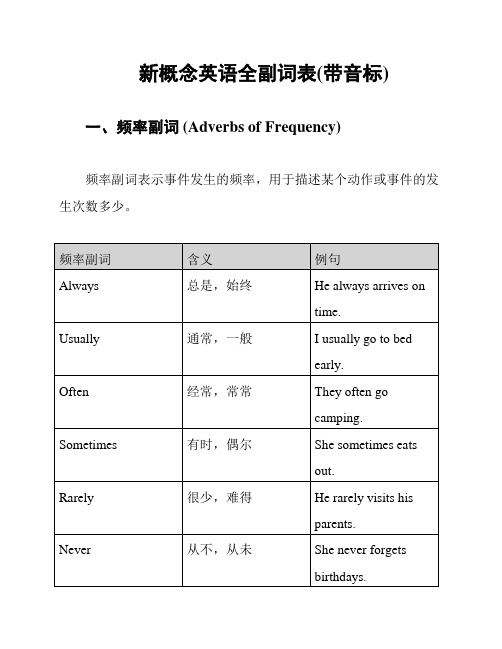
任何地方
You can sit anywhere you like.
以上是新概念英语全副词表(带音标)的完整版,希望对你的研究有所帮助!
Often
经常,常常
They often go camping.
Sometimes
有时,偶尔
She sometimes eats out.
Rarely
很少,难得
He rarely visits his parents.
Never
从不,从未
She never forgets birthdays.
二、程度副词(Adverbs of Degree)
新概念英语全副词表(带音标)
一、频率副词(Adverbs of Frequency)
频率副词表示事件发生的频率,用于描述某个动作或事件的发生次数多少。
频率副词
含义
例句
Always
总是,始终
He always arrives on time.
Usually
通常,一般
I usually go to bed early.
Today
今天
I will meet her today.
Yesterห้องสมุดไป่ตู้ay
昨天
I saw him yesterday.
Tomorrow
明天
We have a meeting tomorrow.
Soon
不久,很快
The film will start soon.
四、地点副词(Adverbs of Place)
程度副词用于描述动作或状态的程度,强调某个动作或情况的强弱程度。
程度副词
英语副词整理
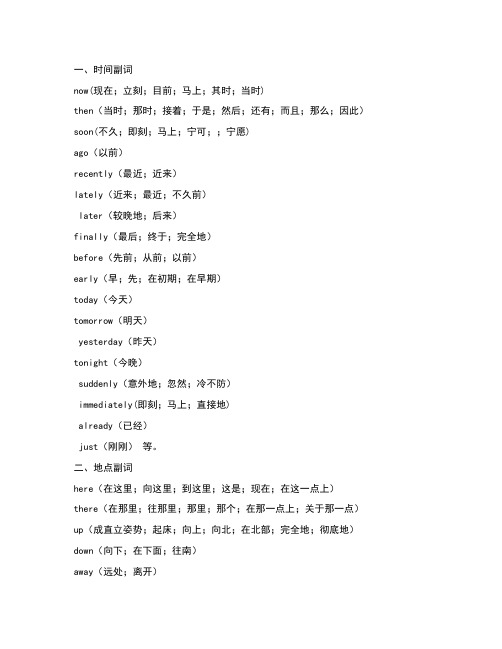
一、时间副词now(现在;立刻;目前;马上;其时;当时)then(当时;那时;接着;于是;然后;还有;而且;那么;因此)soon(不久;即刻;马上;宁可;;宁愿)ago(以前)recently(最近;近来)lately(近来;最近;不久前)later(较晚地;后来)finally(最后;终于;完全地)before(先前;从前;以前)early(早;先;在初期;在早期)today(今天)tomorrow(明天)yesterday(昨天)tonight(今晚)suddenly(意外地;忽然;冷不防)immediately(即刻;马上;直接地)already(已经)just(刚刚)等。
二、地点副词here(在这里;向这里;到这里;这是;现在;在这一点上)there(在那里;往那里;那里;那个;在那一点上;关于那一点)up(成直立姿势;起床;向上;向北;在北部;完全地;彻底地)down(向下;在下面;往南)away(远处;离开)nearby(附近地)home(家)ahead(在某人或某事物的前面)abroad(离口侧;对口侧)indoors(在室内;往室内)overseas(在[向]海外;在[向]国外)halfway(半途;中间)upstairs(在楼上;往楼上)downstairs(在楼下)等。
三、方式副词carefully, happily, quietly, heavily, warmly, correctly, politely, angrily四、频度副词always(总是;永远),often(经常),once(一次;曾经),twice(两次;两倍),sometimes(有时候),usually(通常)等(b)ever(在任何时候;在某时;有时;从来),hardly ever(几乎从不;很少),never(从不;永不;从来没有),rarely(不常;很少地),seldom(很少)等五、程度副词fairly(公平地;诚实地),pretty(相当),rather(在一定的程度上;相当),quite(完全地;整体地;十分地;同意;不错;对的),very(完全;非常;十分;极),much(十分;差不多;几乎),too(太;再),greatly(大大地;非常),almost(几乎;差不多;差一点;将近),nearly(几乎;差不多),half(一半),highly(高度地;极;非常;非常赞许地),awfully(厌恶),deeply(在深处;到深处;强烈地;深刻地;精心地;巧妙地),partly(部分地;不完全地;在一定的程度上),perfectly(完美地;理想地;完全地;十足地),really(真正地;确实地;实际地;很;十分;全然)等。
30个副词英语

30个副词英语副词是一类在句子中修饰动词、形容词、副词、全句或者整个句子的词语。
它们可以提供更多的细节和信息,丰富句子的表达。
在英语中,副词扮演着重要角色,使得句子更加生动有力。
下面将为你介绍30个常用的英语副词。
1. Adoringly(崇拜地)- She looked at him adoringly, impressed by his talent.2. Angrily(生气地)- He shouted angrily at the referee after the game.3. Briskly(轻快地)- The dog walked briskly through the park, excited to be outside.4. Carefully(小心地)- She handled the fragile vase carefully, fearing it might break.5. Deliberately(故意地)- He deliberately ignored her, wanting to geta reaction.6. Eagerly(渴望地)- The children eagerly lined up for ice cream on a hot summer day.7. Frantically(疯狂地)- She searched frantically for her lost keys, turning the house upside down.8. Gently(温柔地)- The mother held her baby gently, rocking him to sleep.9. Happily(开心地)- They danced happily at the wedding, celebrating the couple's joy.10. Incessantly(不停地)- The rain fell incessantly throughout the night, keeping them awake.11. Joyfully(快乐地)- The children laughed joyfully as they played in the park.12. Luxuriously(奢侈地)- They enjoyed a luxuriously appointed hotel suite on their vacation.13. Mysteriously(神秘地)- The magician disappeared mysteriously behind the curtain, leaving the audience in awe.14. Nervously(紧张地)- He tapped his fingers nervously on the table, waiting for the interview to start.15. Optimistically(乐观地)- Despite the challenges, she approached the situation optimistically.16. Patiently(耐心地)- The teacher patiently explained the concept to the confused student.17. Quickly(快速地)- He ran quickly to catch the bus before it left.18. Reluctantly(勉强地)- She reluctantly accepted the invitation, knowing she had other commitments.19. Seriously(认真地)- He studied seriously for the exam, determined to achieve a high score.20. Tightly(紧紧地)- She hugged her friend tightly, not wanting to let go.21. Unbelievably(难以置信地)- The news of their engagement was unbelievably exciting.22. Vividly(生动地)- The author described the scene vividly, making readers feel like they were there.23. Wistfully(留恋地)- He looked wistfully at the old photo, reminiscing about the past.24. Yearningly(渴望地)- The athlete yearned yearningly for victory, training hard every day.25. Zealously(热情地)- She worked zealously on her project, determined to make it the best.26. Abruptly(突然地)- The phone rang abruptly, startling everyone in the room.27. Carelessly(粗心地)- She carelessly knocked over the glass, causing it to shatter.28. Honestly(诚实地)- He spoke honestly about his mistakes, wanting to make amends.29. Painfully(痛苦地)- The injured player walked painfully off the field, clutching his leg.30. Quietly(安静地)- They sat quietly in the library, studying for their exams.这些副词可以帮助你丰富句子的表达,使其更具感染力和准确性。
初中英语副词总结归纳大全
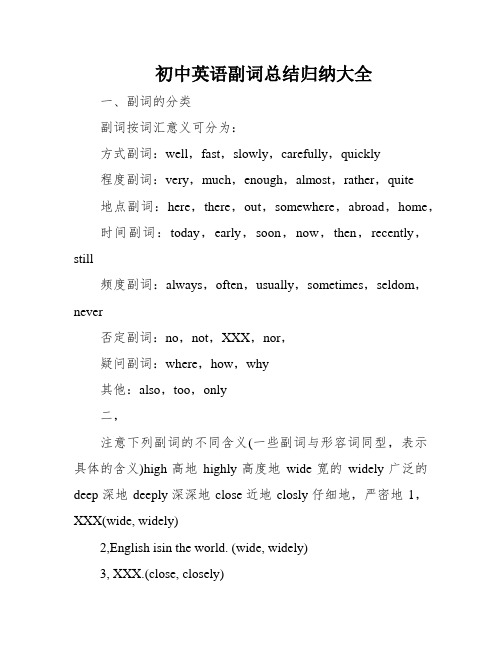
初中英语副词总结归纳大全一、副词的分类副词按词汇意义可分为:方式副词:well,fast,slowly,carefully,quickly程度副词:very,much,enough,almost,rather,quite地点副词:here,there,out,somewhere,abroad,home,时间副词:today,early,soon,now,then,recently,still频度副词:always,often,usually,sometimes,seldom,never否定副词:no,not,XXX,nor,疑问副词:where,how,why其他:also,too,only二,注意下列副词的不同含义(一些副词与形容词同型,表示具体的含义)high高地highly高度地wide宽的widely广泛的deep深地deeply深深地close近地closly仔细地,严密地1,XXX(wide, widely)2,English isin the world. (wide, widely)3, XXX.(close, closely)4, Watch him(close, closely)5, XXX was flying.(high, highly)6, XXX(high, highly)7, XXX.(deep, deeply)7, XXX(deep, deeply)两种形式的副词含义迥异。
XXX迟,晚XXX最近hard勉力的,艰苦地hardly几乎不just方才,仅仅,正好justly公道地,合理地most很,最mostly主要地almost几乎,差不多三,其它副词比较:1, already与yet的区分already用于一定句句中,透露表现“已经”;yet用于否认句句末,透露表现“还”,用于疑问句句末,透露表现“已经”比方,He had already left when I called.当我给他打德律风时,他已经离开了。
英语副词归纳

简介副词连用顺序:程度副词+方式副词+地点副词+时间副词。
副词fùcí[adverb] 起修饰或限制动词或形容词作用、表程度或范围的词。
分类1) 时间和频率副词:now,then,often,always,usually,early,today,late,next,lastday,already,generally,frequently, seldom,ever,never,yet, soon,too, immediately, finally,shortly, before, ago,sometimes, yesterday. once,twice2) 地点副词:here, there, everywhere, anywhere, in, out, inside, outside, above, below, down, back, forward, home, upstairs, downstairs, across, along, round , around, near, off, past, up, away, on.3) 方式副词:carefully, properly, anxiously, suddenly, normally, fast, well, calmly, politely, proudly, softly, warmly4) 程度副词:much,little, very,rather,so,too,still, quite, perfectly, enough, extremely, entirely,almost, slightly, hardly.5) 疑问副词:how, when, where, why.6) 关系副词:when, where, why. how等。
7) 连接副词:therefore,moreover,however,otherwise,then,when ,where,how,why 等。
- 1、下载文档前请自行甄别文档内容的完整性,平台不提供额外的编辑、内容补充、找答案等附加服务。
- 2、"仅部分预览"的文档,不可在线预览部分如存在完整性等问题,可反馈申请退款(可完整预览的文档不适用该条件!)。
- 3、如文档侵犯您的权益,请联系客服反馈,我们会尽快为您处理(人工客服工作时间:9:00-18:30)。
简介副词连用顺序:程度副词+方式副词+地点副词+时间副词。
副词fùcí[adverb] 起修饰或限制动词或形容词作用、表程度或范围的词。
分类1) 时间和频率副词:now,then,often,always,usually,early,today,late,next,lastday,already,generally,frequently, seldom,ever,never,yet, soon,too, immediately, finally,shortly, before, ago,sometimes, yesterday. once,twice2) 地点副词:here, there, everywhere, anywhere, in, out, inside, outside, above, below, down, back, forward, home, upstairs, downstairs, across, along, round , around, near, off, past, up, away, on.3) 方式副词:carefully, properly, anxiously, suddenly, normally, fast, well, calmly, politely, proudly, softly, warmly4) 程度副词:much,little, very,rather,so,too,still, quite, perfectly, enough, extremely, entirely,almost, slightly, hardly.5) 疑问副词:how, when, where, why.6) 关系副词:when, where, why. how等。
7) 连接副词:therefore,moreover,however,otherwise,then,when ,where,how,why 等。
用法副词在句中可作状语,表语,补语,定语。
He works hard. (作状语)他工作努力。
You speak English very well. (作状语)你英语讲的相当好。
Is she in ? (作表语)她在家吗?Let's be out. (作表语)让我们出去吧。
Food here is hardly to get. (作状语)这儿很难弄到食物。
Let him out!(作补语)让他出去!.修饰名词的副词放在被修饰词之后a. The villagers there are busy getting in wheat位置1) 实义动词之前,be动词、情态动词之后。
I am also Bush.I can also do that.I also want to play that games.I get up early in the morning every day.我每天早早起床。
He gave me a gift yesterday.他昨天给了我一件礼物。
She didn't drink water enough.她喝的水不够。
The train goes fast.火车跑得快。
We can go to this school freely.我们可以免费到这家学校学习。
They left a life hardly then.当时他们的生活很艰难。
He has a new hat on today.他今天戴了一顶新帽子。
I have seen this film twice with my friends.这部电影我和朋友看过两次。
2) 副词修饰形容词,副词时,副词在前面,而被修饰的词在后面。
It's rather easy, I can do it.这很容易,我能做到。
He did it quite well.他做得相当好。
It's rather difficult to tell who is right.很难说谁是对的。
It's so important that I must tell my friends.这件事太重要了,我得告诉我的朋友。
It's much better.好多了。
3) 频度副词可放在实义动词的前面,情态动词和助动词的后面。
I often help him these days.这些日子我经常帮助他。
I always remember the day when I first cameto this school.我常常记得我第一次来学校的那一天。
You mustn't always help me.你不能老是帮助我。
He seldom comes to see us.他很少来看我们。
We usually go shopping once a week.我们通常一周买一次东西。
The new students don't always go to dance.新学生并不时常去跳舞。
4) 疑问副词,连接副词,关系副词以及修饰整个句子的副词,通常放在句子或从句的前面。
When do you study everyday?你每天什么时间学习?Can you tell me how you did it?你能告诉我你如何做的吗?First, let me ask you some questions.先让我来问几个问题。
How much does this bike cost?这辆车子多少钱?Either you go or he comes.不是你去就是他来。
The students were reading when the teacher came into the classroom.当老师进教室时,学生们正在读书。
5) 时间副词和地点副词在一个句中, 地点副词在前面,时间副词在后面。
We went shopping in the supermarket at 9 o'clock yesterday.昨天九点钟我们到超市买东西了.What were you doing in the classroom yesterday afternoon?昨天下午你在教室里干什么?The accident took place in the Eleven Avenue one hour ago.一小时前十一号大街发生了一场事故。
6)否定副词在句首,句子要倒装,如:Never have I felt so excited!我从来没有觉得太激动了!比较等级副词和形容词一样,也有它的比较级和最高级形式. 可以参考形容词的变换形式。
但以词尾 -ly 结尾的副词(除 early )须用 more 和 most 。
hard harder hardestfast faster fastestearly earlier earliestmuch more mostwarmly more warmly most warmly单音节副词的比较级是在副词后面加上 -er 构成的,最高级是在副词后面加上 -est 构成的。
near nearer nearesthard harder hardest多音节副词的比较级是在副词的前面加上 -more 构成的。
最高级是在副词前面加上 -most 构成的。
warmly more warmly most warmlysuccessfully more successfully most successfully有些副词的比较级和最高级形式是不规则的。
well-better - best little - less(er) - leastmuch- more - most badly - worse - worstfar-farther(further)-farthest(furthest)副词的比较级和最高级用法同形容词的比较级用法基本一样。
最高级形式句中 the 可以省略。
He works harder than I.他比我工作努力。
Lucy gets up earlier than Lili.露西比丽丽起床早。
He runs fastest in our class.他在我们班跑地最快。
He dives deeper than his teammates.他比他的队员潜水深。
It's true that he speak English more fluently than any of us.他英语讲的确实比我们任何人都好。
Our school team play football best in our region.我们校队在我们地区足球踢得最好的。
副词比较级和最高级的形式形容词的比较级和最高级构成A 大多数单音节形容词的比较级和最高级的构成是在其原级后面加上-er和-est:small----smaller----smallestnew----newer----newestB 许多单音节形容词只有一个元音字母,其末尾为一辅音字母。
在比较级和最高级形式中,这个辅音字母要双写:big----bigger----biggestthin----thinner----thinnestC 许多单音节形容词以-e结尾,如 nice。
这些形容词只需在原级形式后加-r和-stlarge----larger----largestnice----nicer----nicestD 有些形容词以-y结尾,而在-y前是一个辅音字母。
这些形容词一般有两个音节。
变为比较级和最高级时,-y要变成-i,末尾再加-er和-est:easy----easier----easiestheavy----heavier----heaviestE 但有少数形容词的比较级和最高级是不规则的,必须熟记,如:good----better----bestbad----worse----worstF 大多数较长的形容词(即有两个以上音节的词)可与more连用构成其比较级形式,与most连用构成其最高级形式。
比较级和最高级的基本用法原级比较的基本用法1. 原级比较由“as+形容词或副词(或再加名词或短语)+as ”构成“原级相同”比较句,表示两者比较;其否定式,即“程度不及”比较句型为“not so(as) +形容词或副词+as”,而且as…as结构前可用just, almost, nearly, quite等表示程度的词修饰1) Walking briskly for thirty minutes will burn as many calories as .〔A〕 to run for fifteen minutes〔B〕 running for fifteen minutes〔C〕 you run for fifteen minutes〔D〕 fifteen?minute walking2) The gorilla(大猩猩), while〔A〕 not quite as curious than〔B〕 the chimpanzee(黑猩猩), shows more persistence〔C〕 and memory retention(记忆力) in solving〔D〕 a problem.3) Alaska is twice〔A〕 as larger〔B〕 as〔C〕 the next largest〔D〕 state, Texas.2. “as (so)+名词+as+名词”进行名词比较,这时一般情况下有一个表示原级的比较词,但如果第一名词前出现了形容词修饰该词或出现副词修饰谓语,应当用so而不用as4) Thomas Jefferson’s achievements as an architect rival his contributions a politician.〔A〕 such〔B〕 more〔C〕 as〔D〕 than5) I should say Henry is not much a writer as a reporter. (88年考题)〔A〕 that〔B〕 so〔C〕 this〔D〕 as3. 表示“是……几倍”时用“twice; three times等 + as 形容\副词as...” eg. 1)This book costs twice as much as that one. 这本书的价钱是那本书的两倍。
